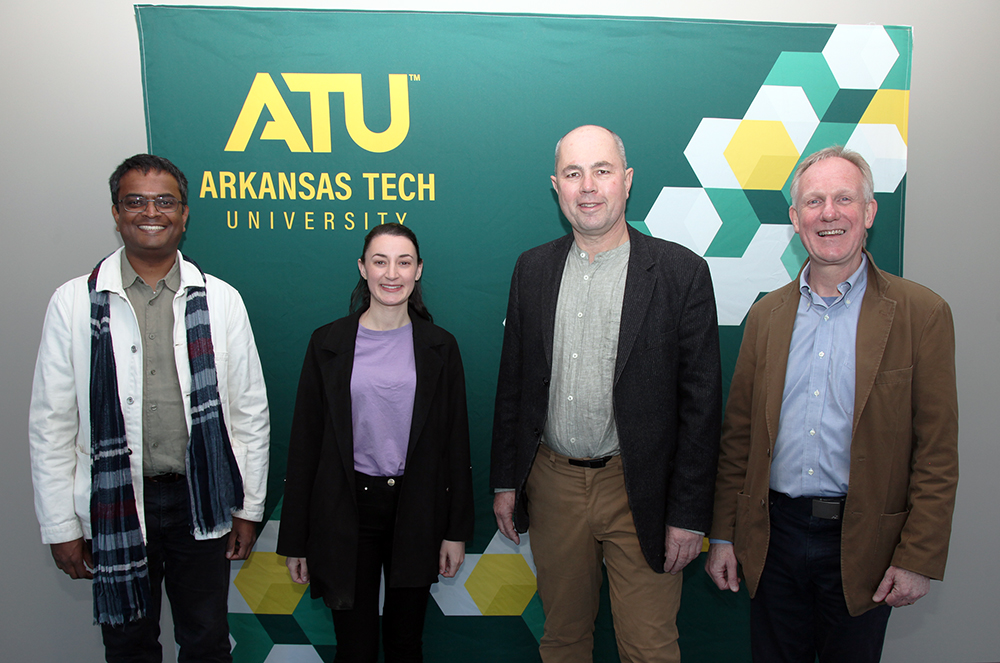
Few people can match Vincent Coudé du Foresto when it comes to in-person experience with total solar eclipses.
An astronomer and director of the laboratory of space studies and instrumentation in astrophysics at the Paris Observatory in France, Coudé du Foresto has witnessed nine total solar eclipses from locations as varied as Egypt, Spain, Chile, Easter Island, the Chinese-Mongolian border and the cockpit of a Concorde jet. He was on the Wyoming-Idaho border for the 2017 total solar eclipse in the United States.
So as Coudé du Foresto prepares to witness his 10th total solar eclipse in Russellville, Ark., on Monday, April 8, what is his advice for first timers?
“Enjoy it,” said Coudé du Foresto while attending a welcome reception at Arkansas Tech University on Wednesday, April 3. “Don’t try to waste your time or energy or concentration into making a picture. Leave it for the pros. You will see lots of very good pictures of the eclipse. Be with the people you want to be with, be in a relaxed setting and basically be ready to enjoy the show.”
Coudé du Foresto is joined on his first trip to Arkansas by Paris Observatory colleagues Miguel Montargés and Mathilde Mâlin. Montargés represented the group by speaking at an informational session about solar eclipses at ATU’s Witherspoon Auditorium on Thursday, April 4.
“Eclipses have played a very important role scientifically in the past because they were the only way to see that part of the sun which you usually do not see, which is the corona and the coronasphere,” said Coudé du Foresto. “What we usually see is the very bright part of the sun, which is called the photosphere. You need to block out the photosphere to see the rest.”
Coudé du Foresto explained that up until the mid-20th century, astronomers were required to travel great distances and take on complex expeditions in order to study eclipses from a scientific standpoint.
That was when Bernard Ferdinand Lyot, an astronomer at the venue where Coudé du Foresto works today, the Paris Observatory, invented a method to create artificial eclipses.
“With that system, which is called a coronagraph, we can see the corona anytime we see fit,” said Coudé du Foresto. “It became less of a necessity to see eclipses for scientific reasons, so most of the eclipse chasers now are there for the fun.
“I am a professional astronomer, but I am also an eclipse fan,” continued Coudé du Foresto. “Ever since I saw my first eclipse, I was hooked on it. They always happen in unlikely places because that’s nature. I like this game where nature decides the moment and the location and you have to see how to compose with it. It’s an amazing moment. Every time it is different. It’s a very moving moment, so it’s very addictive.”
The Paris Observatory delegation is among thousands of tourists expected to visit Russellville for the 2024 total solar eclipse. Estimates based on data from previous total solar eclipses predict there will be more tourists than residents in Russellville by the time the area experiences totality from 1:50-1:54 p.m. on Monday, April 8.
“In most places where eclipses occur, they are not used to being the center of the world,” said Coudé du Foresto. “I recall an eclipse I saw on the border between Mongolia and China in a very remote area. Very few people live there. They told us it was amazing because they are Kazakh people and they feel forgotten by their government. To feel that they were put on the map was a great sense of pride.
“This feeling of convergence also…you have people from all walks of life who live the same event which is emotionally charged, and so that creates a moment that is amazing,” continued Coudé du Foresto. “An eclipse is a moment that puts you in direct connection with the sun and the moon. There is this perfect alignment between the sun, the moon and yourself. It creates a connection with the cosmos. That is what you feel with the utmost importance at that moment. When a whole group of different people have this same very strong experience…it’s amazing the kinds of bonds it can create.”





